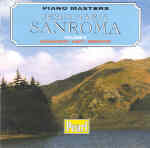Jesus Maria Sanroma (1902-84) made his mark in the 1930s and ’40s as a new-music champion and gramophone pioneer, and the three compositions here are presented in their first complete recordings. In fact, for years Sanroma’s was the only recording of Paderewski’s underrated, tuneful A minor concerto. Sanroma’s unbridled energy and rhythmic panache serve the virtuosic outer movements well (the finale’s scampering repeated notes, for instance), and his fingers are more than up to the first-movement cadenza’s burly demands. The original sonics, however, are rather drab and one-dimensional, and there’s much more to Paderewski’s colorful orchestration than meets the ear. Moreover, no special interpretive insights emerge that have not been matched and often superceded by the work’s handful of modern recordings, my favorites being Wild/Fiedler (Elan), Fialkowska/Wit (Naxos), and, for the piano part alone, Piers Lane’s entry in Hyperion’s Romantic Concerto cycle.
Although the Sanroma/Fiedler Liszt Totentanz dates two years prior to the Paderewski, it’s a better recording altogether, with superior balance for piano and orchestra. Fiedler’s crisp accompaniment features incisive articulation from the fiddles, nice percussion work, and full-throated, snarling brass. But the pianist’s flinty tone, along with a lack of nervous energy and demonic ardor, rarely goes beyond adequate playing of Liszt’s notes (or most of them, anyway). Strange how the most recent item, Gershwin’s F major concerto, holds the least sonic allure. For starters, the piano is too distant in the mix, which forces you to focus upon Fiedler’s generally fast, faceless, and not-too-interesting accompaniment (but who is that gorgeous, fat-toned, and utterly unidiomatic trumpet soloist in the slow movement?).
In fairness, Fiedler did the Concerto a thousand times better 20 years later with a more inspired piano soloist named Earl Wild, abetted by stereo engineering that continues to sound great to this day. If you have to have a so-called “historic” Concerto in F with poor sound in your larder, try to locate the Oscar Levant broadcast with Toscanini and the NBC Symphony. Roger Beardsley’s transfers are truthful and benefit from what I suspect to be a discreet pinch of fake reverb.
































